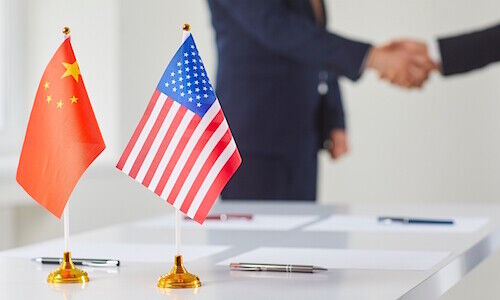Will the Trade War De-Escalate After the Latest Deal?
The US and China have made a breakthrough in the latest trade deal. Could permanent de-escalation be underway?
The US and China have reached an agreement to remove most tariffs imposed since April 2 for 90 days following negotiations over the weekend in Geneva, Switzerland.
According to a joint statement, the US will lower its overall tariffs on Chinese goods from 145 percent to 30 percent while China will cut American import tariffs from 125 percent to 10 percent, effective May 14.
«Both parties affirmed the importance of the critical bilateral economic and trade relationship between both countries and the global economy,» the statement said.
Longer Term Tariff Outlook
According to a note by UBS’s chief investment office, the deal is consistent with its base case that the effective US tariff on Chinese imports will settle around 30 to 40 percent.
Trade negotiations aside, the bank believes that the growing number of court cases challenging the tariffs could become a «pivotal force» in lowering the levies, and the US administration could accelerate de-escalation efforts if it anticipates an unfavorable ruling.
Three Implications
In a separate note, Eli Lee, Bank of Singapore’s chief investment strategist, highlighted three implications from the deal. First, tariff reprieve will reduce tail risks for growth and earnings.
Second, the newest tariffs set a baseline rate for what to expect from US trade talks with other countries. Third, de-escalation was deeper and faster than expected by the market and will serve as a positive near-term catalyst for risk assets.
«In any case, this negotiation process will likely take months, if not years, and there is a risk of re-escalation as we reach the end of the 90 days if talks flounder,» Lee added.
Banks Flag Risk of «Global Crisis»
The latest trade deal follows the announcement of most banks' first-quarter earnings. The trade war and tariffs were prominently featured in many of the financial results, with some boosting credit provisions or adjusting their outlooks.
HSBC, for example, has assessed scenarios that model «significantly higher tariffs, and related impacts on growth, policy rates and inflation on our earnings» with the potential for a low single-digit percentage impact on the group’s revenue and around $500 million of incremental expected credit losses. At UBS, a «global crisis» was added as a possible scenario with a 15 percent chance of occurring.
Growing Macroeconomic Uncertainties
And at Singapore-based UOB, 2025 earnings guidance was paused altogether until the situation stabilizes, with a 35 basis point increase in credit costs due to «additional pre-emptive allowance set aside to strengthen provision coverage amid growing macroeconomic uncertainties».


























